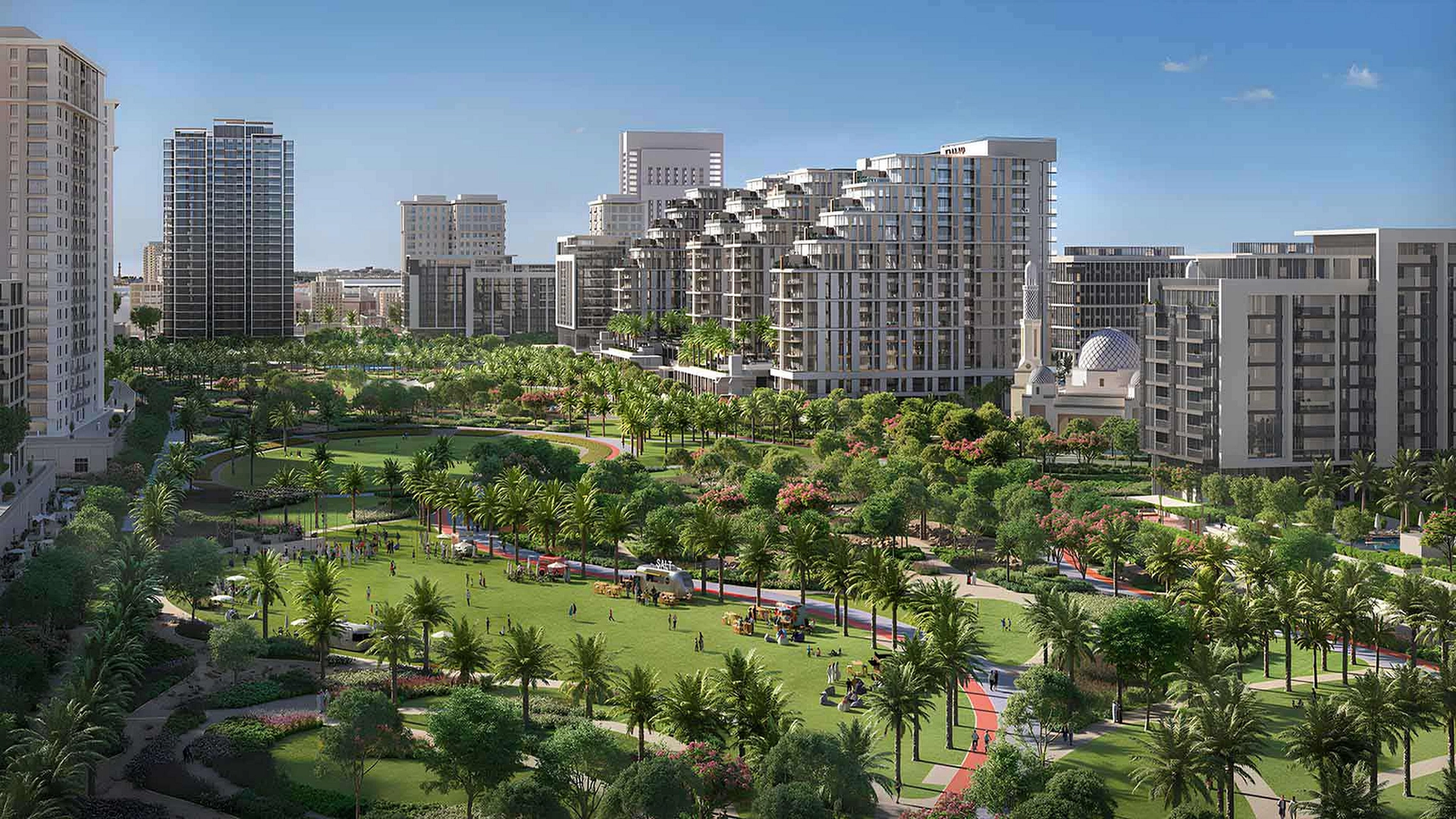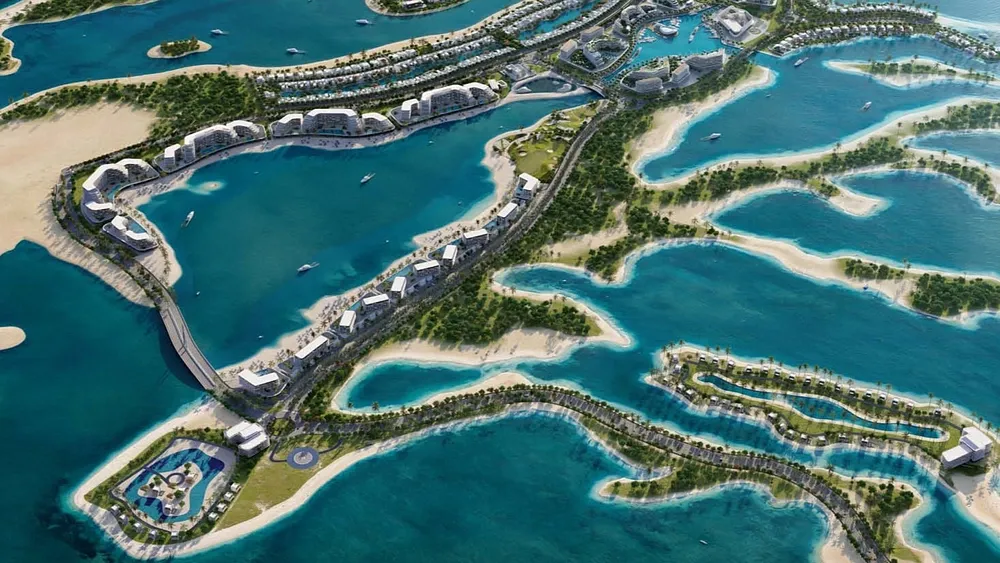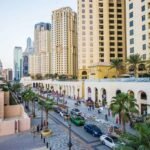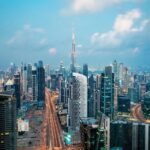Now Reading: Dubai Creek Harbour 2025: The New Downtown for Investors and Residents
-
01
Dubai Creek Harbour 2025: The New Downtown for Investors and Residents
Dubai Creek Harbour 2025: The New Downtown for Investors and Residents
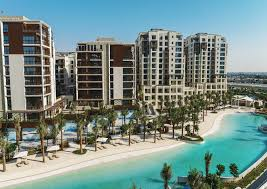
Table of Contents
Imagine waking in a sleek apartment, your smart home unveiling floor-to-ceiling views of a shimmering creek and the iconic Dubai skyline, with Burj Al Arab twinkling in the distance. You savor coffee on a private balcony, work from a high-tech home office, or stroll along a vibrant waterfront promenade to a yoga class, all within a dynamic urban oasis. In 2025, Dubai Creek Harbour is emerging as Dubai’s new downtown, blending wellness, sustainability, and cutting-edge design in a master-planned community. This waterfront hub is fueling Dubai’s real estate boom, with 96,000 transactions worth $87 billion in the first half, 58% driven by buyers from the UK, India, Russia, and China.
Offering 100% freehold ownership, a dirham pegged to the U.S. dollar, and no personal income tax, capital gains tax, or annual property taxes, these properties priced from $1 million to $6 million deliver 6-8% rental yields and 8-12% price appreciation, outpacing London (2-4%) and New York (2-3%). Properties over $545,000 qualify for a 10-year Golden Visa, while smaller units grant 2-year residency.
Powered by 25 million tourists and a 4% population surge, Dubai Creek Harbour integrates smart technology, green spaces, and lifestyle amenities to create homes that are as lucrative as they are life-enhancing. Navigating fees, VAT, and 2025 regulations is key to securing your place in this radiant urban haven.
A New Downtown with Global Appeal
Dubai Creek Harbour, just 10 minutes from Downtown Dubai via Al Khail Road, is redefining urban living with its 7.4 million square meters of waterfront residences, retail hubs, and cultural landmarks like the upcoming Creek Tower. Boasting vacancy rates of 1-2% compared to 7-10% globally, a $1.5 million apartment yields $90,000-$120,000 annually, tax-free, saving $33,300-$54,000 versus the U.S. (37%) or UK (45%).
Selling for $1.8 million (20% appreciation) delivers a $300,000 tax-free profit, saving $60,000-$84,000 compared to London (20-28%) or New York (20-37%). No property taxes save $15,000-$60,000 yearly, unlike London’s council tax (up to 2%) or New York’s property tax (1-2%). Residential purchases skip 5% VAT ($50,000-$300,000), and proximity to marinas, art galleries, and wellness hubs drives 8-12% price growth. This vibrant community attracts global buyers seeking a blend of urban energy and waterfront serenity.
Living here feels like stepping into a radiant, modern metropolis.
Wellness and Community at the Core
Dubai Creek Harbour embraces 2025’s wellness trend with yoga studios, waterfront fitness trails, and organic cafés integrated into its master plan. These $1 million-$6 million properties yield $60,000-$360,000 annually, tax-free, saving $22,200-$162,000 versus taxed markets. Short-term rentals, fueled by 25 million tourists visiting cultural events like art fairs, require a DTCM license ($408-$816), boosting yields by 10-15% ($6,000-$54,000).
Long-term leases, popular with families near top-tier schools, need Ejari registration ($54-$136). Non-compliance risks fines up to $13,612, so licensing is crucial. Wellness amenities like meditation pods and air-purified lounges enhance appeal, with 85-90% occupancy rates driven by demand for healthful urban living. A 4% DLD fee ($40,000-$240,000), often split, applies, but zero capital gains tax saves $48,000-$360,000 on $240,000-$1.8 million profits.
Wellness-focused homes feel like a rejuvenating urban retreat.
Smart Technology for Modern Lifestyles
Smart technology defines Dubai Creek Harbour’s 2025 developments, with AI-driven homes offering energy monitoring, climate control, and wellness apps for sleep and fitness tracking. These $1 million-$6 million properties yield $60,000-$360,000 annually, tax-free, saving $22,200-$162,000 compared to taxed markets.
Maintenance fees ($10,000-$40,000) cover smart security and IoT-enabled amenities like automated parking, aligning with global luxury standards. Selling a $1 million apartment for $1.2 million yields a $200,000 tax-free profit, saving $40,000-$56,000 versus London or New York. With 8-12% price growth driven by tech-savvy buyers, these homes cater to professionals seeking connected urban lifestyles, supported by proximity to business districts like DIFC, just 15 minutes away.
Smart homes feel like a seamless blend of innovation and comfort.
Sustainability for a Greener Tomorrow
Sustainability is woven into Dubai Creek Harbour’s fabric, with eco-friendly features like solar panels, water recycling, and green rooftops aligning with Dubai’s net-zero goals by 2050. These $1 million-$6 million properties yield $60,000-$360,000 annually, tax-free, saving $22,200-$162,000. No property taxes save $10,000-$60,000 yearly, and VAT exemptions save $50,000-$300,000 on purchases.
Maintenance fees ($10,000-$40,000) cover green amenities like community gardens and smart irrigation. Selling a $2 million villa for $2.4 million yields a $400,000 tax-free profit, saving $80,000-$112,000. With 8-12% price growth driven by eco-conscious buyers, this community attracts global investors seeking sustainable urban luxury.
Sustainable homes feel like a vibrant step toward a greener future.
No Personal Income Tax: Rentals That Thrive
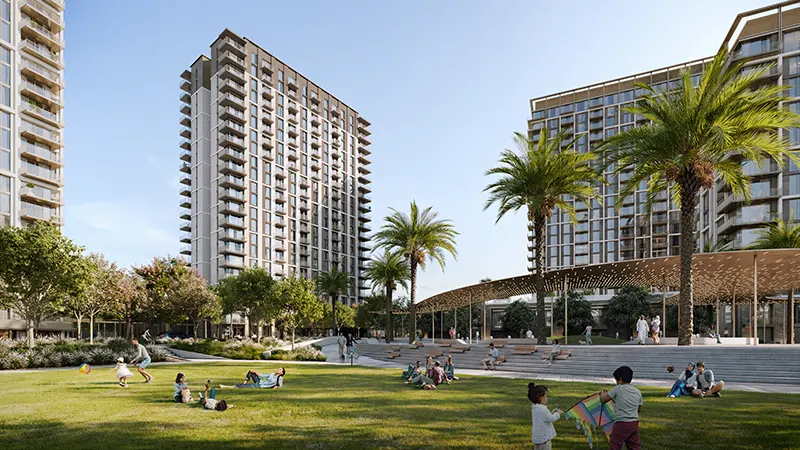
Dubai’s no personal income tax policy lets you keep 100% of rental income, unlike the U.S. (up to 37%) or UK (up to 45%). A $1 million apartment yields $60,000-$80,000, saving $22,200-$36,000; a $6 million villa yields $270,000-$360,000, saving $121,500-$162,000. Short-term rentals, fueled by tourists visiting waterfront events, require a DTCM license ($408-$816), boosting yields by 10-15%. Long-term leases, ideal for families, need Ejari registration ($54-$136). A 5% municipality fee on rentals ($3,000-$18,000) applies, but non-compliance risks fines up to $13,612. Wellness and smart amenities enhance rental appeal, aligning with 2025’s lifestyle trends and driving 85-90% occupancy.
Tax-free rentals feel like a refreshing wave of prosperity.
Zero Capital Gains Tax: Profits That Soar
Zero capital gains tax lets you keep 100% of sale profits. Selling a $1.5 million apartment for $1.8 million yields a $300,000 tax-free profit, saving $60,000-$84,000 versus London (20-28%) or New York (20-37%). A $6 million villa sold for $7.2 million delivers a $1.2 million tax-free gain, saving $240,000-$336,000. With 8-12% price growth driven by urban and wellness trends, these properties outperform global markets, where similar homes rarely exceed $4 million. A 4% DLD fee ($40,000-$240,000), often split, applies, but tax-free profits make these homes wealth-building powerhouses.
Keeping every dirham feels like a radiant financial triumph.
No Annual Property Taxes: Ownership That Feels Light
Unlike global markets, Dubai Creek Harbour imposes no annual property taxes, saving $10,000-$60,000 yearly on $1 million-$6 million properties compared to London’s council tax ($20,000-$120,000) or New York’s property tax (1-2%). Maintenance fees ($10,000-$40,000) cover wellness hubs, green spaces, and 24/7 security, aligning with global luxury standards. A 5% municipality fee on rentals ($3,000-$18,000) is reasonable for this prime location. These low costs make ownership sustainable, supporting a lifestyle that feels vibrant and effortless, perfectly suited to 2025’s urban vision.
No property taxes feel like a gentle breeze lifting your investment.
VAT Rules: A Savvy Investor’s Edge
Residential purchases skip 5% VAT, saving $50,000-$300,000 on $1 million-$6 million properties, unlike commercial properties or the UK’s stamp duty (up to 12%, or $120,000-$720,000). Off-plan purchases incur 5% VAT on developer fees ($10,000-$60,000), recoverable via Federal Tax Authority (FTA) registration ($500-$1,000). Short-term rental operators must register for VAT if revenue exceeds $102,041, charging 5% but claiming credits on DTCM fees ($408-$816). A $1 million apartment yielding $60,000-$80,000 incurs $3,000-$4,000 in VAT, with $1,000-$1,500 in credits; a $6 million villa yielding $270,000-$360,000 incurs $13,500-$18,000 in VAT, with $2,000-$3,000 in credits. Non-compliance risks fines up to $13,612, so meticulous records are key.
VAT exemptions feel like a clever boost to your savings.
DLD Fees and Title Deeds: Securing Your Urban Haven
The 4% DLD fee, typically split, applies: $40,000 for a $1 million apartment or $240,000 for a $6 million villa. Gift transfers to family or shareholders reduce DLD to 0.125%, saving $38,750-$232,500. For example, gifting a $6 million villa cuts DLD from $240,000 to $7,500. Title deed issuance costs $136-$272, requiring DLD registration. Broker fees, typically 2% ($20,000-$120,000), may be waived for off-plan projects. Mortgage registration (0.25% of the loan, or $2,500-$15,000) and valuation fees ($680-$1,360) apply for financed deals. The 2025 Oqood system ensures escrow compliance for off-plan purchases, protecting your investment.
Title deeds feel like the key to your vibrant sanctuary.
Corporate Tax: A Business Buyer’s Note
Introduced in 2023, the 9% corporate tax applies to businesses with profits over $102,110. A company leasing a $1 million apartment yielding $60,000-$80,000 faces a 9% tax ($5,400-$7,200), reducing net income to $54,600-$72,800. A $6 million villa yielding $270,000-$360,000 incurs $24,300-$32,400 in tax. Qualified Free Zone Person (QFZP) status in areas like DMCC avoids this, saving $5,400-$32,400, with setup costs of $2,000-$5,000. Small business relief waives corporate tax for revenues under $816,000 until December 31, 2026. Individual ownership skips this tax, ideal for most investors.
Corporate tax feels like a soft ripple you can navigate.
New Tax Rules for 2025
The Domestic Minimum Top-up Tax (DMTT), effective January 1, 2025, imposes a 15% tax on multinationals with revenues over €750 million ($793 million). Individual investors and smaller entities are unaffected, and QFZP status avoids DMTT, saving $5,400-$54,000. Cabinet Decision No. 34 refines Qualifying Investment Fund (QIF) rules, exempting corporate tax if real estate income is below 10%. A QIF earning $1 million, with $100,000 from rentals, faces 9% tax ($8,100) on 90% ($900,000). A July 2025 policy allows corporate tax deductions on fair market value depreciation, saving $1,818-$10,909 annually for a $1 million apartment revalued at $1.2 million. These rules enhance Dubai Creek Harbour’s appeal.
New tax rules feel like a puzzle with prosperous solutions.
Why Dubai Creek Harbour Shines
Price Range: $1 million-$6 million, suiting mid-to-high-end buyers.
Rental Yields: 6-8%, with short-term rentals at 6-8% due to tourist demand; long-term at 6-7% for stability.
Price Appreciation: 8-12%, driven by urban and wellness trends.
Lifestyle: Waterfront promenades, wellness hubs, and smart tech create vibrant living.
Amenities: Yoga studios, green spaces, and cultural hubs enhance appeal.
ROI Verdict: 8-12% ROI, blending urban luxury with stellar returns.
Dubai Creek Harbour feels like a radiant, modern metropolis.
Strategies to Maximize Returns
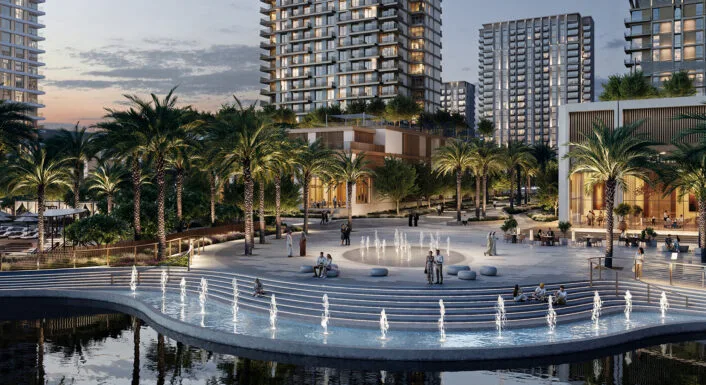
For individuals: Hold properties personally to avoid corporate taxes, saving $5,400-$32,400. Negotiate DLD fee splits, saving $20,000-$120,000. Use gift transfers to reduce DLD to 0.125%, saving $38,750-$232,500. Recover 5% VAT on developer fees via FTA registration ($500-$1,000). Leverage double taxation treaties with 130+ countries, saving $22,200-$162,000.
U.S. investors deduct depreciation ($18,182-$109,091), saving up to $38,182. For corporates: Secure QFZP status, keep QIF income below 10%, and claim depreciation deductions. Hire property managers ($10,000-$40,000 annually) and tax professionals ($1,000-$3,000) to avoid fines up to $136,125. Focus on short-term rentals for tourist-driven yields, long-term for family-oriented stability.
These strategies feel like a roadmap to your urban wealth.
Risks to Watch in 2025
A projected oversupply of 182,000 units by 2026 may slightly slow price growth in newer phases, but Dubai Creek Harbour’s established appeal ensures resilience. Off-plan delays risk setbacks, so choose trusted developer Emaar and verify escrow compliance via the 2025 Oqood system. Non-compliance with VAT or DTCM rules risks fines up to $13,612, and corporate tax errors can cost $136,125. Indian investors must report properties in India’s Foreign Asset schedule to avoid $135,000 penalties. Currency fluctuations, though minimal with the dollar peg, could impact returns.
Why Dubai Creek Harbour Is Worth It
With 8-12% ROI, 8-12% growth, and tax-free savings of $10,000-$360,000 annually, Dubai Creek Harbour offers vibrant residences, lifestyle-driven amenities, and global appeal. Golden Visa perks, 85-90% rental occupancy, and a lifestyle blending wellness, tech, and sustainability make it a 2025 investment gem. Navigate fees, secure your urban haven, and invest in Dubai’s radiant future.
read more: How Dubai Real Estate Is Adapting to Lifestyle Trends in 2025



